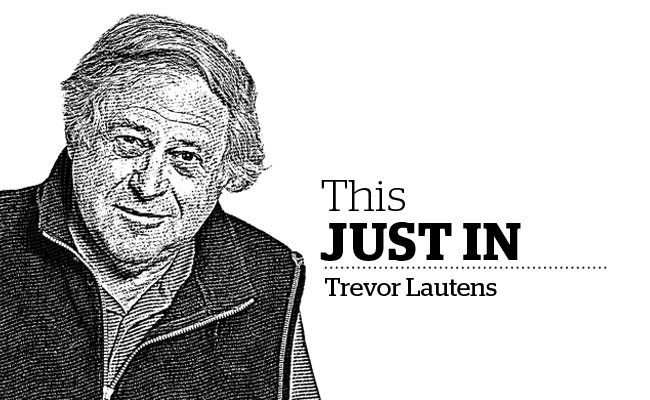Let’s get this over with: Ontario Premier Kathleen (Queen of Debt) Wynne confabbing with buddy Justin Trudeau is like a railway dispatcher advising the train robbers which car is carrying the gold bullion.
• • •
Quite rightly, there will be a lot of retrospectives and interviews with the shrinking ranks of veterans as Remembrance Day approaches.
But, pushing a thinning calendar ahead of me, these days I think more about the Second World War’s marks on the non-combatants. Far from the savagery, I wasn’t hurt a lick, but many such people carried something less than a wound and more than a scratch inside, forever unhealed.
Not in any chronological order: I think of a war-evacuated young Englishman, not quite adopted but something like that, by the mayor of my hometown (among war’s “borrowed parents,” as some called them). In Canada, years after the war, he got a reporter’s job, the mayor connection not hurting of course, with the local paper. Quiet. Shy. Not the Front Page type. Can’t recall — young reporter myself — ever talking to him. He killed himself. What was the “why”?
Ben Wicks was one of those jokey, peppy little Englishmen — almost a bit too much personality squeezed into too small a body. Evacuated beyond German bombing range like thousands of other children, in 1988 Wicks — by then one of Canada’s most popular cartoonists — published an invaluable book of such evacuees’ experiences, No Time to Wave Goodbye. Some “borrowed parents” were touchingly kind. Some were unspeakable sexual monsters, an outrageous assault on the decency the war was fought to protect. Rotting in Hell would be too good for them, then as now.
Some uncomfortable war truths are buried under forgetfulness and war-glorifying movies. When Nazi Germany conquered countries, who worked in their factories producing war materiel? The conquered, of course. They had little choice. Richard Overy, in The Bombers and the Bombed: Allied Air War Over Europe, 1940-1945 (Viking Penguin), notes that by the end of 1943 about 75,000 Belgian and 109,000 Dutch workers were employed under German arms contracts.
What was euphemistically called “bad shooting,” such as the bombing of Mortsel, Belgium, which killed 926 including 209 children, seriously damaged the Allied air forces’ reputation among people who had previously welcomed bombing of the occupiers. A Dutch woman seeking compensation wrote a wrenching letter to George VI: “It may seem rather impudent from me, to ask you for help, but I know you are righteous and honest....”
The British Air Ministry could only confirm that destruction of her house was “a hazard of war” and “if we started paying for this kind of loss there would be no end to our liability.”
With all the human carnage, this small incident sticks in memory: An American soldier idly shot a farmer’s cow. The suffering animal ran in agonized circles before dying. Revolting.
Some Canadians on the home front didn’t much put their shoulder to the wheel. There was grumbling about business profiteering, a black market for those in the know, griping about rationing, even that our best-quality food was sent to our soldiers in Britain.
On which latter point, our family has laughed for decades about Mrs. Brown — “an old-country Englishwoman,” to quote my mother — who, hearing a rumour that soap would be rationed, rushed out and bought boxes of it. “You have to get it,” she explained with an almost genius level of self-unawareness, “before the hoarders get it.”
You youngsters under 70 will hear the solemn words and music on Remembrance Day, but not so much the ribald wartime songs, or the declarations of some surviving soldiers claiming that the war was the best years of their lives.
A war footnote: In the current furor over razing fine old Shaughnessy houses, it would be timely to recall Ottawa’s wartime diktat suspending all municipal zoning bylaws to allow — force — single-family homes to be broken up to accommodate war workers. War over, the egg, scrambled, couldn’t easily be unscrambled. Legal bombs were tossed between Shaughnessy’s old-money and landlord-money factions. In the mid-1960s I lived in such a disputed suite — master bedroom, palatial bathroom, 1911 house — steps from the former mansion of tycoon Dal Grauer. For $75 a month!
It’s mystifying that Nov. 11 retains its drawing power. In this repressive secular age, Remembrance Day is unapologetically religious, clearly centred on Christian prayer and hymns. Somehow the cranks and professional atheists overlook it.
For many, too, it’s a day that stirs Canada’s suppressed bonds with a small nation that stood alone in darkest 1940, led by the right man for the right hour.
There were damp eyes at a recent Vancouver Symphony concert when conductor Bramwell Tovey, hunched over the piano, movingly played “A Nightingale Sang in Berkeley Square,” one of the great unofficial wartime anthems of a land of heroes enough.
Former Vancouver Sun columnist Trevor Lautens writes every second Friday on politics and life with a West Vancouver bias. He can be reached via email at [email protected].
What are your thoughts? Send us a letter via email by clicking here or post a comment below.



